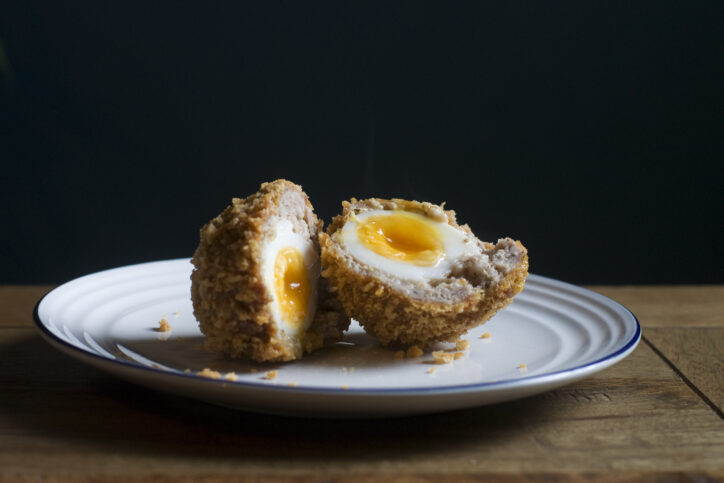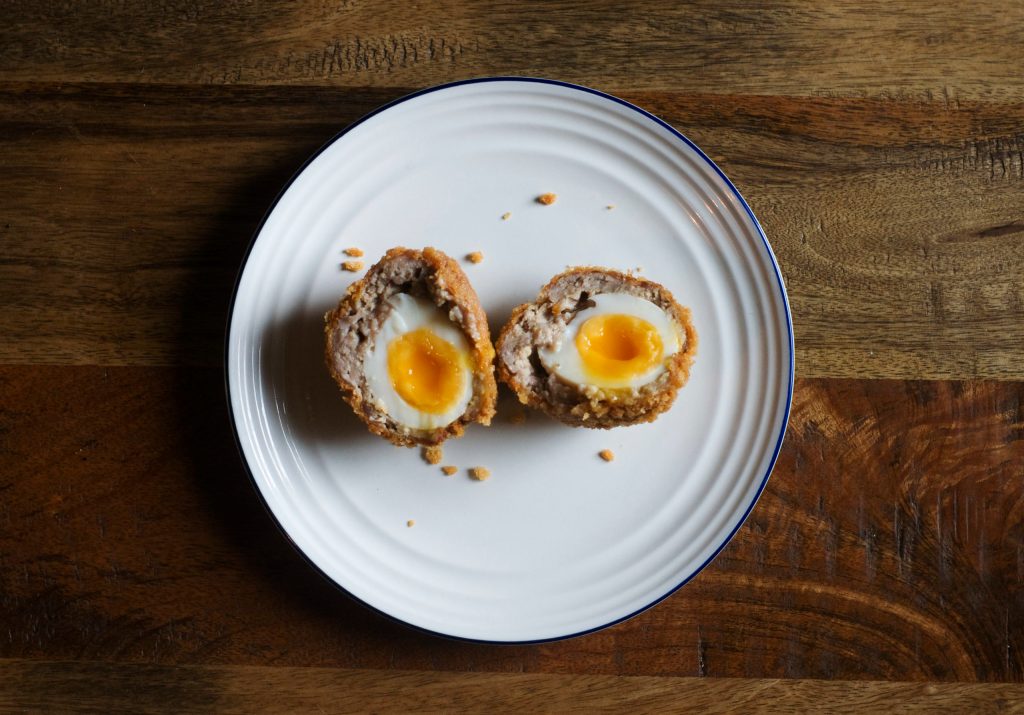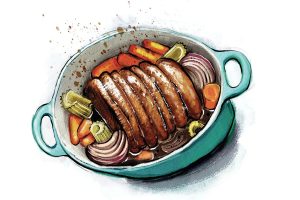Many moons ago, long before I learnt how to cook properly, I took it upon myself to make Scotch eggs. It seemed like a nice little weekend activity but, looking back, it was doomed from the get-go. My boiled eggs were too soft and threatened to splurge their yolks.
The meat I used was mealy, not fatty enough, and crumbled when I tried to press it onto the eggs. I didn’t really understand how you coated food for frying so haphazardly stuck breadcrumbs to what little meat was forlornly clinging to my misshapen egg. I tried to fry them anyway: it did not go well. Scotch eggs shouldn’t be this hard, I thought. Who can be bothered with this? I ended up smashing the whole thing up (in resignation rather than anger), and turning it into a slightly strange hash.
That’s one of the greatest advantages of cooking, I guess: even when things go horribly wrong, you can usually still eat your mistakes. You can’t say the same for pottery.
I got one thing right that day: Scotch eggs shouldn’t be that hard. Yes, a good Scotch egg is pretty bloody impressive, but with a good recipe in hand, they’re really not that tricky. These are truly superlative Scotch eggs and, while recipe testing them hasn’t exactly been a hardship, I’ve spent the last couple of months honing and perfecting them, getting them just right, so that you don’t end up with a slightly sad sausage and egg hash.
The six-minute boiled egg means that the yolk is jammy, almost runny, but firm enough to hold itself when you peel and then wrap the egg. A well-seasoned, slightly fatty sausage does a lot of the leg work for you in a good Scotch egg. The crunchy exterior bears no relation to those orange, crumby examples of the genre you can buy in multipacks; using Japanese panko breadcrumbs rather than fresh white breadcrumbs creates a gorgeous golden coating.
These Scotch eggs can be eaten hot or cold, but a warm Scotch egg, freshly fried, is a thing of real joy.

[special_offer]
Scotch eggs
Makes: 4 large Scotch eggs
Takes: 30 minutes, plus chilling
Fry: No time at all
6 Eggs
6 pork sausages
1 tablespoon of your favorite mustard
½ teaspoon ground white pepper
100g plain flour
100g Panko breadcrumbs
½ gallon vegetable oil
- Bring a pan of water to the boil, and add four of the eggs to the pan. Boil for six minutes exactly, then immediately transfer into a bowl of iced water. Leave to cool completely, then carefully peel the eggs.
- Split the sausage skins, and decant the sausage meat into a bowl. Add the pepper/mustard and squidge with your hands.
- Divide the sausage meat into four equal portions. Taking one portion, place it on a sheet of clingfilm. Fold the clingfilm over the top of the sausagemeat, and flatten into a sheet. Peel off the top layer of clingfilm, and roll the sheet of sausagemeat around one of the boiled eggs, pinching the meat closed at points where it meats. Gently roll the sausage-covered egg between your two cupped hands, to create an even ball. Repeat with the other three boiled eggs.
- Set out three small bowls: fill one with the flour, one with beaten egg, and one with the panko breadcrumbs. Dip one of the sausage-covered eggs into the flour, then the egg, then the breadcrumbs, ensuring with each dip, that the eggs are completely coated. Set on a lined baking tray, repeat with the other eggs, then refrigerate until you’re ready to fry.
- Fill a large, deep pan with ½ gallon of vegetable oil, and heat to 350°F, or until a cube of bread dropped into the oil rises to the top and turns golden.
- Gently lower the scotch eggs into the oil and cook for seven minutes, occasionally turning with a slotted spoon. Lift the scotch eggs from the oil with the slotted spoon and set onto kitchen paper to drain. Allow the vegetable oil to cool completely before decanting and disposing. Sprinkle with a little coarse salt, and serve hot or cold.
This article was originally published onSpectator Life.


















